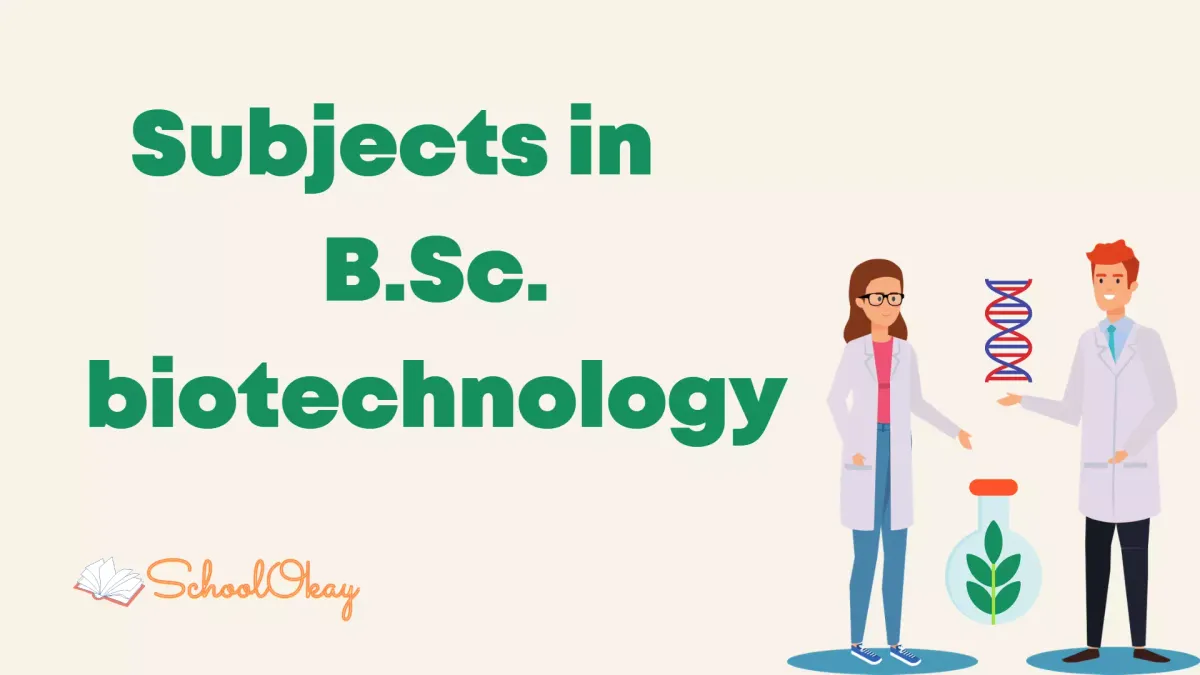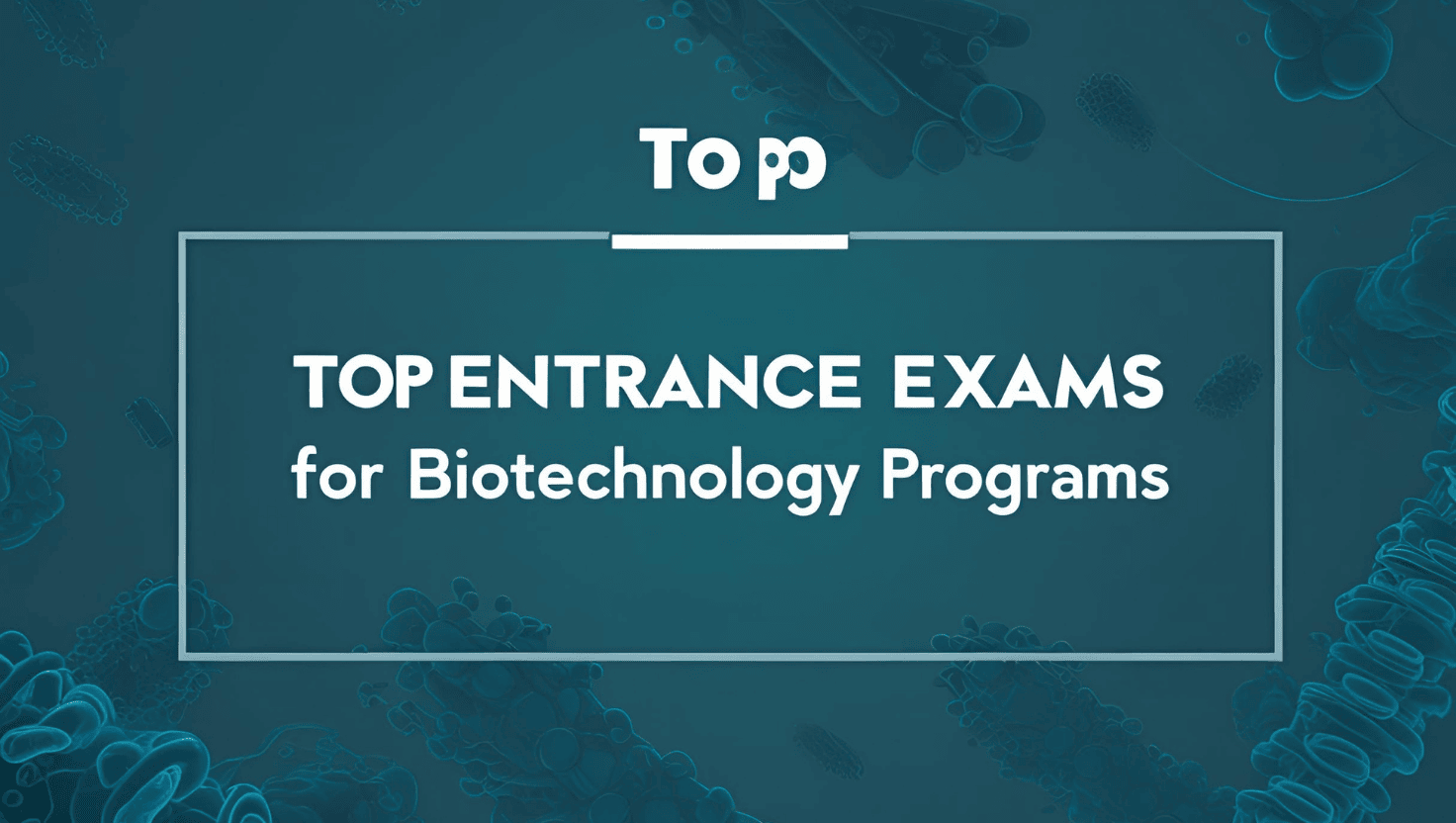Subjects in B.Sc. biotechnology
In this article, we will explore the subjects studied during BSc Biotechnology and delve into the exciting world of biotechnology.

Biotechnology referring to 'Biological technology', is a field that is based on using living organisms or microorganisms that can be used to improve human life and other organism's life. If you have decided on taking this course let's talk about the knowledge gained throughout the course. In this article, we will explore the subjects studied during BSc Biotechnology and delve into the exciting world of biotechnology.
What Is Biotechnology?
Biotechnology involves using biological systems, such as cells, microorganisms, and biomolecules, to develop or improve products, processes, or services in fields such as medicine, agriculture, environmental conservation, and industrial manufacturing.
It encompasses various techniques, including genetic engineering, fermentation, bioinformatics, tissue culture, and bioprocessing, among others. Biotechnology has significant implications for human health, food production, energy production, and environmental sustainability, and it continues to be a rapidly evolving and interdisciplinary field with diverse applications and ethical considerations.
Bsc Biotechnology Syllabus
Throughout B.Sc. Biotechnology program, students study a wide range of subjects, one of the fundamental subjects Molecular Biology, focuses on the structure, function, and manipulation of DNA, RNA, and proteins.
Students learn about techniques such as PCR (Polymerase Chain Reaction), DNA sequencing, and genetic engineering, which have revolutionized fields like genetic diagnostics, gene therapy, and genetically modified organisms (GMOs).
Cell and Molecular Biology
At the heart of biotechnology lies the study of cells and molecules, which are the fundamental building blocks of life. Students in a BSc Biotechnology program typically delve into the intricacies of cell structure and function, including cell organelles, cellular metabolism, and cell signalling.
Additionally, molecular biology is a key component of biotechnology studies, covering topics such as DNA structure and replication, gene expression and regulation, and genetic engineering techniques. Understanding these fundamental concepts provides students with a solid foundation for more advanced biotechnology studies.
Biochemistry
The study of chemical reactions and materials that take place inside living things is known as biochemistry. Students that enrol in a BSc Biotechnology program study enzymology, metabolism, and bioenergetics in addition to the structure and function of biological molecules like proteins, nucleic acids, and carbohydrates.
Understanding molecular interactions in biotechnological processes like protein engineering and recombinant DNA technologies is essential.
Genetics and Genetic Engineering
The study of genes and inheritance is known as genetics, and it is a crucial component of biotechnology. Students majoring in biotechnology typically study the fundamentals of population genetics, Mendelian genetics, and molecular genetics, as well as genetic illnesses.
Furthermore, a major focus of biotechnology research is on genetic engineering methods, which change an organism's genetic makeup by modifying DNA. Students study recombinant DNA engineering, gene cloning, CRISPR-Cas9 gene editing, and the moral ramifications of genetic engineering.
Bioprocessing and Biomanufacturing
Bioprocessing and biomanufacturing are crucial aspects of biotechnology that involve the production of biological products at a large scale. BSc Biotechnology students often study the principles and techniques of bioprocessing, including fermentation, downstream processing, and product purification.
This may also include an overview of biomanufacturing processes used in the production of biopharmaceuticals, enzymes, biofuels, and other biotechnology-derived products. Students may also learn about the design and optimization of bioprocessing and biomanufacturing strategies, as well as quality control and regulatory considerations.
Microbiology
Microorganisms play a vital role in biotechnology, and studying microbiology provides students with an understanding of different types of microorganisms, their structure, physiology, and their role in biotechnological applications. Students learn about microbial fermentation, bioprocessing, and the production of valuable products such as enzymes, antibiotics, and biofuels.
Bioinformatics and Computational Biology
With big data and advanced computing technologies, bioinformatics and computational biology have emerged as critical fields within biotechnology. BSc Biotechnology students may study the application of computational methods, algorithms, and tools in biological research and data analysis.
This may include topics such as genomics, proteomics, and bioinformatics databases, as well as the use of computational tools for sequence analysis, protein modelling, and drug discovery. Students may also learn about the integration of biological data with computer algorithms to gain insights into complex biological systems.
Biomedical Biotechnology
Biomedical biotechnology focuses on the application of biotechnology in healthcare and medicine. Students in a BSc Biotechnology program may study the principles and techniques of medical biotechnology, including genetic testing, gene therapy, stem cell research, and regenerative medicine.
This may also include an overview of biotechnology applications in drug discovery and development, diagnostic techniques, and personalized medicine.
Ethics in Biotechnology and Elective Courses
As biotechnology has a profound impact on society, this subject focuses on the ethical and social implications of biotechnological applications. Students learn about ethical considerations related to genetic engineering, cloning, stem cell research, and other controversial topics in biotechnology.
There are numerous BSc Biotechnology programmes that provide elective classes that let you focus on a particular area of interest. Depending on your interests and career aspirations, you have a variety of elective courses to choose from. Some examples of elective courses in biotechnology include entrepreneurship, biopharmaceuticals, plant biotechnology, environmental biotechnology, and immunology.
Important Books for B.Sc. biotechnology
As a biotechnology student pursuing a Bachelor of Science (B.Sc.) degree, there are several books that can help you deepen your understanding of the subject. Here are some recommended books for B.Sc. biotechnology students:
- Biotechnology: An Introduction" by Susan R. Barnum - This textbook provides a comprehensive introduction to the field of biotechnology, covering topics such as genetic engineering, gene cloning, DNA sequencing, and bioprocessing. It also explores the ethical, legal, and social implications of biotechnology.
- Molecular Biotechnology: Principles and Applications of Recombinant DNA by Bernard R. Glick and Jack J. Pasternak - The study of genes and inheritance is known as genetics, and it is a crucial component of biotechnology. Students majoring in biotechnology typically study the fundamentals of population genetics, Mendelian genetics, and molecular genetics, as well as genetic illnesses.
Furthermore, a major focus of biotechnology research is on genetic engineering methods, which change an organism's genetic makeup by modifying DNA. Students study recombinant DNA engineering, gene cloning, CRISPR-Cas9 gene editing, and the moral ramifications of genetic engineering. - Introduction to Biotechnology by William J. Thieman and Michael A. Palladino - This textbook provides a comprehensive introduction to the principles and applications of biotechnology, including genetic engineering, gene cloning, and bioprocessing. It also covers ethical, legal, and social issues related to biotechnology and its applications in areas such as agriculture, medicine, and environmental science.
- Bioprocess Engineering: Basic Concepts by Michael L. Shuler and Fikret Kargi - This book focuses on the engineering aspects of bioprocessing, including fermentation, downstream processing, and bioreactor design. It covers fundamental concepts and techniques used in bioprocess engineering, making it a valuable resource for students interested in the industrial applications of biotechnology.
- Principles of Genetic Engineering by R.K. Gupta - This book covers the principles and techniques of genetic engineering, including gene cloning, gene expression, and genetic modification of organisms. It also discusses the applications of genetic engineering in areas such as agriculture, medicine, and biopharmaceuticals.
- Plant Biotechnology: The Genetic Manipulation of Plants by Adrian Slater, Nigel W. Scott, and Mark R. Fowler - This textbook focuses on the principles and techniques of plant biotechnology, including genetic engineering, tissue culture, and plant transformation. It covers topics such as plant genetic modification, crop improvement, and biotechnology applications in plant breeding and agriculture.
- Bioinformatics: Principles and Applications by Zhumar Ghosh and Bibekanand Mallick - This book provides an introduction to the field of bioinformatics, which involves the application of computational methods and techniques to analyze biological data. It covers topics such as DNA sequencing, gene prediction, protein structure prediction, and functional genomics, making it a valuable resource for students interested in the intersection of biotechnology and computer science.
These are just a few examples of the many books available for B.Sc. biotechnology students. Depending on your specific interests and coursework, you may also find additional resources that are relevant to your studies. It's always a good idea to consult with your professors or academic advisors for recommendations tailored to your specific needs.
Colleges in Bengaluru
Bengaluru is a prominent city in India and a hub for education and technology. There are several colleges in Bangalore that offer B.Sc. Biotechnology programs. Here are some options:
- Christ University offers a BSc in Biotechnology programme at its reputed private institution in Bangalore. The curriculum is designed to provide a comprehensive understanding of biotechnology and its applications in various fields such as agriculture, healthcare, and pharmaceuticals.
- St. Joseph's College is a renowned autonomous college in Bangalore that offers a BSc in Biotechnology program. The college has well-equipped laboratories, research facilities, and experienced faculty who provide a strong foundation in biotechnology and its applications.
- Mount Carmel College is a premier women's college in Bangalore that offers a BSc in Biotechnology program. The college has modern infrastructure, well-equipped laboratories, and experienced faculty who provide a holistic approach to learning biotechnology.
- Jyoti Nivas College is a reputed autonomous college in Bangalore that offers a BSc in Biotechnology program. The college has state-of-the-art laboratories, research facilities, and a strong emphasis on research-oriented learning.
- Bangalore University is a renowned public university in Bangalore that offers a BSc in Biotechnology program. The university has well-established departments of biotechnology with experienced faculty, modern laboratories, and research facilities for hands-on learning and research opportunities.
- Dayananda Sagar College of Arts, Science, and Commerce is a well-known college in Bangalore that offers a BSc in Biotechnology program. it provides a great combination of facilities and faculties that you will enjoy learning from. The opportunities provided are immense.
These are some of the best colleges to study BSc Biotechnology in Bangalore. It's always recommended to visit the colleges and review the curriculum, faculty credentials, facilities, and research opportunities before making a final decision.
Conclusion
In conclusion, pursuing a B.Sc. degree in Biotechnology opens up a world of exciting possibilities. The subjects studied during the program provide students with a strong foundation in molecular biology, biochemistry, bioprocess engineering, genetics, and other specialized areas of biotechnology, equipping them with the knowledge and skills to contribute to cutting-edge research and development in the field.
Whether developing new drugs, genetically engineering crops for better yields, or designing sustainable bio-based products, biotechnologists play a crucial role in shaping the future of science and technology. With constant advancements and breakthroughs, the field of biotechnology offers a promising career path for those passionate about pushing the boundaries of science and positively impacting society.
Also read:
Advantages and Disadvantages of Biotechnology you should know before pursuing.
Fssai - Food Safety and Standards Authority of India.
Choosing Biotechnology as A Career After Class 10th.
Share and subscribe to the blog by email.




Comments ()